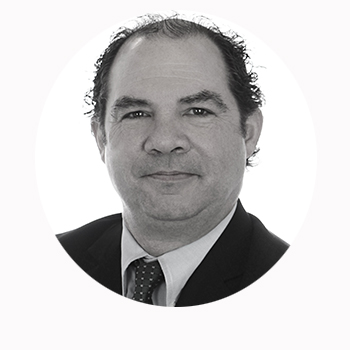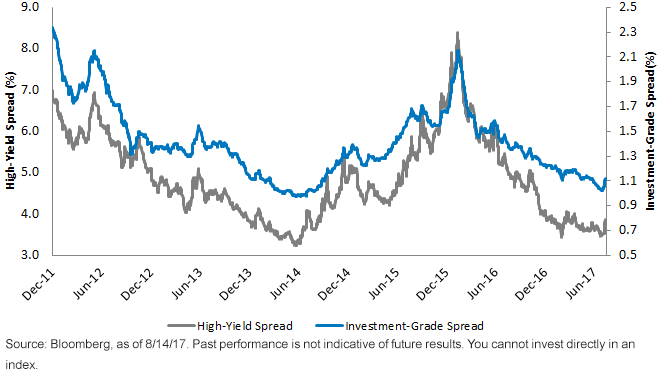U.S. Corporate Bonds: Quality Matters


One question I get on a regular basis is this: Do U.S. corporate bonds have further room to produce positive returns or are they oversold and due for a correction, if not an outright sell-off? Certainly, the performances in both the investment-grade (IG) and high-yield (HY) arenas thus far in 2017 have been among the stronger ones in the realm of global fixed income, and in my opinion, given where spread levels currently reside, it’s a fair question. Let’s take a look at where the IG and HY markets stand and try to answer this query, or perhaps even better, see if there is an alternative approach that fixed income investors should be considering.
The accompanying graph provides a clear-cut illustration of how credit spreads have consistently been on a narrowing trajectory since the recent peak readings were registered in February 2016. To put it in some perspective, as of this writing, IG differentials (as measured by the Bloomberg Barclays U.S. Aggregate Corporate Index) have declined by 13 basis points (bps) year-to-date and by a sizeable 105bps from the aforementioned high-water mark. For HY, the Bloomberg Barclays U.S. Corporate High Yield Index shows the spread 31bps below year-end 2016 and an eye-opening 461bps below the two-year peak. At their current levels, both measures are at their lowest readings in three years.
Investment Grade Spread (RS) vs. High Yield Spread (LS)

This is why the opening question is valid. However, as we discussed in our May 24, 2017, blog post, “U.S. Fixed Income: Taking All the Credit,” spreads are not in uncharted territory and have been down this road before, if not even lower, with the most recent occurrence being the 2003–2007 time frame.
Our fixed income strategy continues to favor credit over interest rate-sensitive sectors, but investors should also be looking for alternative approaches to market cap-based investing. Indeed, I believe a prudent investment strategy would be to pursue improving credit quality in one’s portfolio, from both a tactical and strategic perspective. This is where a fundamentally weighted, or smart beta, approach to corporate bonds makes sense, with the focus being on the balance sheet rather than weighting by the amount of debt outstanding. The latter, or market cap, approach could subject investors to instruments that are investing in the largest debtors, regardless of either valuations or their ability to pay.
The WisdomTree fundamentally weighted strategy for corporate bonds utilizes three time-tested factors to screen for quality: free cash flow over debt service, leverage ratio and return on invested capital (ROIC). Our work has shown that a deterioration in these factors for IG has served as a precursor for a potential downgrade, while declining and negative free cash flow has led to financial distress in the HY universe. For IG, the worst 20% factor scores by sector are then cut, while in HY, all issuers with negative free cash flow are removed. This smart beta approach focuses only on public issuers domiciled in the U.S. and employs a stringent issue-size criterion to help alleviate some liquidity concerns. Along the same lines, for HY, there is an additional liquidity screen where 5% of the smallest and oldest issuers are eliminated. Oftentimes, eliminating troubled credits can involve a sacrifice in overall yield. I believe a focus on improved quality can be worth that trade-off, but our strategy also tilts weight back toward the bonds that remain with more favorable income traits to help offset some of that loss.
How to Put Into Practice
There are four products that follow the aforementioned approach and that investors should consider to improve the quality and complement their fixed income portfolios: the WisdomTree Fundamental U.S. Corporate Bond Fund (WFIG), the WisdomTree Fundamental U.S. Short-Term Corporate Bond Fund (SFIG), the WisdomTree Fundamental U.S. High Yield Corporate Bond Fund (WFHY) and the WisdomTree Fundamental U.S. Short-Term High Yield Corporate Bond Fund (SFHY).
Unless otherwise noted, data source is Bloomberg, as of August 16, 2017.
Important Risks Related to this Article
There are risks associated with investing, including possible loss of principal. Fixed income investments are subject to interest rate risk; their value will normally decline as interest rates rise. High-yield or “junk” bonds have lower credit ratings and involve a greater risk to principal. Fixed income investments are also subject to credit risk, the risk that the issuer of a bond will fail to pay interest and principal in a timely manner or that negative perceptions of the issuer’s ability to make such payments will cause the price of that bond to decline. While the Funds may attempt to limit credit and counterparty exposure, the value of an investment in the Funds may change quickly and without warning in response to issuer or counterparty defaults and changes in the credit ratings of the Fund’s portfolio investments. Please read each Fund’s prospectus for specific details regarding each Fund’s risk profile.

